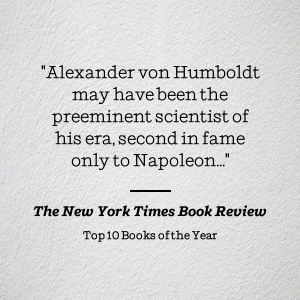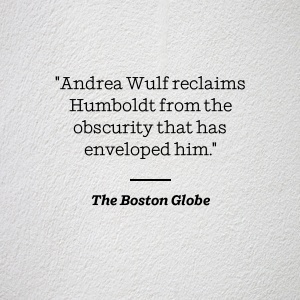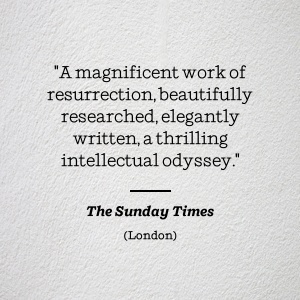Customer Services
Copyright © 2025 Desertcart Holdings Limited


The Invention of Nature: Alexander Von Humboldt's New World



| Best Sellers Rank | #23,638 in Books ( See Top 100 in Books ) #16 in Environmental Science (Books) #25 in Environmentalism #51 in Traveler & Explorer Biographies |
| Customer Reviews | 4.6 4.6 out of 5 stars (4,940) |
| Dimensions | 5.12 x 1.15 x 7.96 inches |
| Edition | Reprint |
| ISBN-10 | 0345806298 |
| ISBN-13 | 978-0345806291 |
| Item Weight | 12.8 ounces |
| Language | English |
| Print length | 576 pages |
| Publication date | October 4, 2016 |
| Publisher | Vintage |
C**N
Excellent and well ;written book.
Loved the book and learned a lot about our past
A**R
Fascinating of an incredible life
This is a detailed and evocative account of the life of a man who was hugely influential in his time and is now almost forgotten. It recounts his South American adventures early in life and his late expedition to Asia, with much interesting history of his life in Paris and Berlin and his contacts with many other famous scientists of the period. All in the context of a turbulent period in European history.It is engagingly written and the author clearly has a profound knowledge of her subject.I thoroughly recommend.
M**C
An epic intellectual adventure filled with historical cameos
Yeah, as everyone says, this is a knock-out biography (though the text in the paperback is agonisingly small). Wulf is a great writer with an incredible command of her subject; Humboldt is a phenomenal hero. I was utterly swept up in the adventure of his life, the world in which he lived, his connection to every historical event and figure from the era (Forest Gump style) and fascinated by his significant contribution to the late Enlightenment; scientific, political and social.That Humboldt's story is now not well known is the whole point of this. Wulf hammers home how all the 19th century intellectual heroes we still hail (Darwin, Thoreau, etc) were Humboldt fan-boys and it's fascinating to see these things in this context. The book delves into some of these fan-boys who came along after Humboldt himself dies. And it's still interesting, but, inevitably, the narrative loses impetus once its hero is no longer actively participating.
A**N
Humbolt: gênio esquecido
Alexander Von Humbolt foi um indivíduo iluminado, que nasceu predestinado, com uma missão a cumprir. Durante a sua juventude esteve sempre relegado ao andeio de buscar o novo, explorar novos destinos, buscar lugares ainda desconhecidos para o europeu da virada dos anos 1790 e 1800. Após ser considerado disperso, até menos dotado intelectualmente que seu irmão, Wilhen, o jovem Alexander buscou no gosto pelas ciências, uma base formidável de conhecimentos nas mais diversas áreas. Não tendo apoio familiar, vindo de uma criação clássica prussiana, sua origem nobre lhe proveu dos recursos necessários para ter uma educação primorosa. NO entnato, apenas após a morte de sua mãe, o jovem adulto Humbolt teve a liberdade para utilizar sua herança para realizar a primeira de suas muitas viagens, porém a mais marcante: exploração dos trópicos e da América do Sul. Em sua expedição, Humbolt cruzou territórios da atual Venezuela, Peru, Colômbia, Chile, Equador, vindo a ser o primeiro explorador científico da Cordilheira dos Andes. Seus amplos conhecimentos em geologia e botânica, bem como sua veia artística, proveram relatos riquíssimos que futuramente seriam editados em coleções de livros de sucesso mundial. Humbolt criou sua teoria da interconectividade da natureza, tendo sido reconhecido como o maior cientista de sua época, com grande influência em governos da Prussia, França, Espanha e Inglaterra. Manteve contato próximo com movimentos revolucionários, pois tinha afeição pela liberdade de pensamento e das ciências. Por fim ainda esteve nos montes Urais, na Rússia, já na meia idade, após esperar mias de uma década para ter autorização explorar as Índias Britânicas, onde sonhava em escalar o Pico Everest. Ao morrer, em idade avançada, mais de 80 anos, deixou longa lista de publicações científicas, cujo termo residiu em sua grande obra: Cosmus. Seu mérto esteve em popularizar o conhecimento científico para as massas. Humbolt é pouco conhecido fora de países que não adota a língua germânica, em grande parte pelo sentimento anti-germâmico oriundo das duas grande guerras do século XX.
J**Y
Great
My friend wanted it for her birthday. Loved it
Trustpilot
3 days ago
3 weeks ago